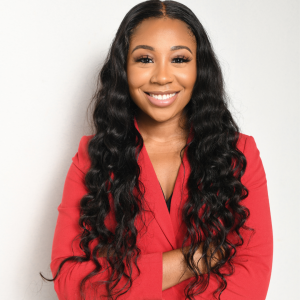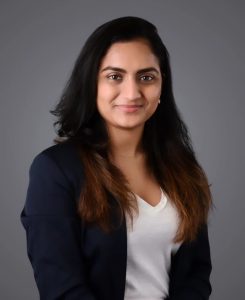While externing at a legal helpline this spring, Arianna Hopkins ’25 often found herself consoling New Yorkers who were in tears—fearful of losing their homes and becoming homeless or seeking to escape domestic violence.
Hopkins and four other Fordham Law students served as community volunteers and externs at the Legal Hand Call-In Center serving East Harlem located at the East Harlem Neighborhood Action Health Action Center. Legal Hand provides information and assistance to visitors to help them resolve problems before they become court cases, and empowers visitors to help themselves.
The students empowered New Yorkers seeking assistance with legal questions, ranging from asylum and immigration to personal injury and family law—gaining hands-on experience throughout the spring semester in client intake, interviewing, legal research, and community-centered legal work across multiple practice areas.

Through this experience, Hopkins says she discovered how critical it was to build a human connection with each individual. She listened attentively to their issues, took notes, and asked uncomfortable questions in a way that made callers feel safe.
“I think the number one skill I took away from this experience was that lawyers must still have empathy,” she said. “It requires so much patience and understanding, but I would not say it was hard because I have always wanted to do this. This was my ‘why.’”
“Helping real people with urgent legal concerns was extremely fulfilling, and it helped me remember why I came to law school in the first place,” added Hopkins, who entered law school with a focus on public interest law. “I’m so grateful that I was able to give back to the East Harlem community that has poured so much into me during my time living here.”
This initiative is part of a new partnership between Fordham Law School’s Public Interest Resource Center (PIRC) and Access to Justice Initiative, Legal Hand, New York Legal Assistance Group, and New York City Department of Health and Mental Hygiene. It comes at a critical time when New York City faces an access to justice crisis, with hundreds of thousands of clients facing civil legal issues without access to an attorney, according to Leah Horowitz ’06, assistant dean for public interest and social justice initiatives.
“There is such a tremendous justice gap that deprives marginalized communities from the information and resources they urgently need, and our students are actively engaged in addressing this,” she said. “And, while doing this, our students have this incredible and unique opportunity to learn about a wide range of public interest practice areas while creatively responding to needs.”
Horowitz added, “We are so proud of our students who have entered into this space to meet people where they are at and in doing that use their training and skills to address people’s pressing needs.”

Graduating students Tasha Brown ’24 and Farishta Vinaykumar Menon, LL.M. ’24, also worked directly with Legal Hand visitors as externs to identify legal issues, research complicated issues, and build out materials on new and changing areas of law that would ultimately empower clients with accurate information. The goal, they said, was to meet clients where they are at, problem solve, and have a positive impact on the lives of individuals and families.
“This experience brought to light the stark reality of how many individuals lack access to legal assistance and suffer as a result,” said Menon. “It was eye-opening to see that many people with strong cases lose simply due to a lack of proper guidance. This realization underscored the significant impact we can make by dedicating even a small portion of our time to help those who are underprivileged.”
For Brown, this opportunity solidified her interest in public service, “Many people stand to benefit from lawyers’ contributions to public service, and this certainly reminded me of that. My time at the center became an important part of my life over the past semester, and I want to make sure I’m intentional about seeking out opportunities like this one in the future.”
Brown added, “At the end of the day, my hope was to ensure that at least one visitor felt less alone and fearful—such that they felt seen—by the time we finished speaking with them.”
